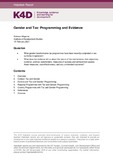Gender and Tax: Programming and Evidence
Abstract
Generally, policymakers and tax analysts (as well as donors concerned about gender equity) have not made proper consideration about how tax policies and tax reforms can interact with gendered cultural norms in developing countries. However, there are worries that tax systems are biased against women and that recent tax reforms may increase the incidence of taxes on women and other underprivileged groups – while, at the same time, failing to garner sufficient tax revenue to fund social programmes necessary to enhance their lives. Since women in developing countries are particularly vulnerable to poverty, a comprehensive and rigorous assessment of tax systems (e.g., existing tax laws, tax administrations and new tax reforms) is needed to understand how they are uniquely affected. Gender-responsive tax programming by donors (and developing-country governments) requires dedication to assess the gender impact of tax policy and tax administration – i.e., who benefits and who is losing from existing tax arrangements or proposed reforms. Although there is growing evidence in the academic literature about the gender dimension of tax, there is still very limited programming by donors on tax policy and tax administration with an explicit focus on gender. Similarly, rarely do donor-funded programmes targeting gendered inequities and empowerment of women incorporate a clear tax agenda. However, there is some evidence that this trend is changing. Some recent regional and country programmes on DRM (e.g., on tax administration, tax policy, tax research, etc.), as well as business and investment climate improvement programmes, are incorporating explicit gender targets into their tax programme components. Some of these regional and country programmes are briefly discussed in the review (with more information on these provided in Sections 4 and 5).
Citation
Megersa, K. (2021). Gender and Tax: Programming and Evidence. K4D Helpdesk Report 959. Brighton, UK: Institute of Development Studies. DOI: 10.19088/K4D.2021.040DOI
10.19088/K4D.2021.040Is part of series
K4D Helpdesk Report;959Rights holder
© Crown copyright 2021Sponsor
FCDO (Foreign, Commonwealth and Development Office)Collections
- K4D [937]

